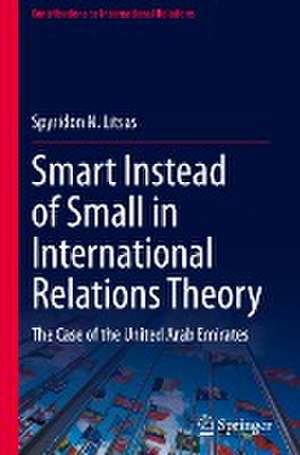Smart Instead of Small in International Relations Theory: The Case of the United Arab Emirates: Contributions to International Relations
Autor Spyridon N. Litsasen Limba Engleză Hardback – 17 noi 2023
Din seria Contributions to International Relations
- 17%
 Preț: 525.08 lei
Preț: 525.08 lei - 24%
 Preț: 629.56 lei
Preț: 629.56 lei - 18%
 Preț: 787.29 lei
Preț: 787.29 lei - 18%
 Preț: 725.43 lei
Preț: 725.43 lei - 15%
 Preț: 697.32 lei
Preț: 697.32 lei - 18%
 Preț: 722.75 lei
Preț: 722.75 lei - 15%
 Preț: 650.19 lei
Preț: 650.19 lei - 18%
 Preț: 894.34 lei
Preț: 894.34 lei - 15%
 Preț: 637.78 lei
Preț: 637.78 lei - 18%
 Preț: 721.95 lei
Preț: 721.95 lei - 15%
 Preț: 689.64 lei
Preț: 689.64 lei -
 Preț: 343.98 lei
Preț: 343.98 lei - 18%
 Preț: 775.30 lei
Preț: 775.30 lei - 24%
 Preț: 687.19 lei
Preț: 687.19 lei - 15%
 Preț: 693.90 lei
Preț: 693.90 lei - 18%
 Preț: 896.70 lei
Preț: 896.70 lei - 15%
 Preț: 698.47 lei
Preț: 698.47 lei - 18%
 Preț: 781.15 lei
Preț: 781.15 lei - 18%
 Preț: 719.13 lei
Preț: 719.13 lei - 18%
 Preț: 730.65 lei
Preț: 730.65 lei - 18%
 Preț: 788.22 lei
Preț: 788.22 lei - 18%
 Preț: 777.03 lei
Preț: 777.03 lei - 18%
 Preț: 785.74 lei
Preț: 785.74 lei - 18%
 Preț: 1023.28 lei
Preț: 1023.28 lei - 15%
 Preț: 693.71 lei
Preț: 693.71 lei - 18%
 Preț: 780.82 lei
Preț: 780.82 lei - 18%
 Preț: 721.51 lei
Preț: 721.51 lei - 18%
 Preț: 886.26 lei
Preț: 886.26 lei - 15%
 Preț: 692.09 lei
Preț: 692.09 lei - 18%
 Preț: 792.19 lei
Preț: 792.19 lei - 18%
 Preț: 727.18 lei
Preț: 727.18 lei
Preț: 699.28 lei
Preț vechi: 822.68 lei
-15% Nou
Puncte Express: 1049
Preț estimativ în valută:
133.84€ • 139.20$ • 112.16£
133.84€ • 139.20$ • 112.16£
Carte tipărită la comandă
Livrare economică 13-27 martie
Preluare comenzi: 021 569.72.76
Specificații
ISBN-13: 9783031446368
ISBN-10: 3031446364
Pagini: 203
Ilustrații: XV, 203 p.
Dimensiuni: 155 x 235 mm
Greutate: 0.49 kg
Ediția:1st ed. 2023
Editura: Springer Nature Switzerland
Colecția Springer
Seria Contributions to International Relations
Locul publicării:Cham, Switzerland
ISBN-10: 3031446364
Pagini: 203
Ilustrații: XV, 203 p.
Dimensiuni: 155 x 235 mm
Greutate: 0.49 kg
Ediția:1st ed. 2023
Editura: Springer Nature Switzerland
Colecția Springer
Seria Contributions to International Relations
Locul publicării:Cham, Switzerland
Cuprins
Acknowledgement-Small States Theory and the failing process of normative analysis-Internal and External Challenges for the Years to Come-Smart instead of Small: Which are the different variables that make a state act smart?-From Oblivion to Modernity: The UAE’s smart birth-Smart Leadership: The cases of Mohamed bin Zayed Al Nahyan & Hamdan bin Mohammed Al Maktoum-Smart States act positively in the international arena: The UAE case-Beyond Smart Power: Tolerance as a source of Smart Ontology-Internal and External Challenges for the Years to Come-Epilogue-Forward
Notă biografică
Spyridon N. Litsas is a Professor of International Relations at the University of Macedonia in Thessaloniki, Greece. He is teaching, researching, and publishing on War Theory, Strategic Analysis, Jihadism, Politics of the Eastern Mediterranean, Middle East and North Africa, US & Russian Foreign Policy in South-Eastern Europe, Turkish Foreign Policy, EU Politics, et al. His most recent publications include, 'US Foreign Policy in the Eastern Mediterranean: Power Politics and Ideology under the Sun'; ‘Stateness and Sovereign Debt: Greece in the European Conundrum’ (with Konstantinos Lavdas & Dimitrios Skiadas); ‘The Eastern Mediterranean in Transition: Multipolarity, Politics and Power’ (eds. with Aristotle Tziampiris), ‘Foreign Policy Under Austerity: Greece’s Return to Normality?’ (eds. with Aristotle Tziampiris). ‘The New Eastern Mediterranean: Theory, Politics and States in a Volatile Era’ (eds. with Aristotle Tziampiris). He has taught International Relations Theory, Security and Leadership as a Visiting Fellow at the Zayed Military University, UAE; SciencesPO, Universite Grenoble Alpes, France; International Hellenic University, Greece; University of Piraeus Greece; Supreme College of War of the Hellenic Armed Forces, Greece; Hellenic Army Academy 'Evelpidon', Greece; Department of Politics, University of Durham, UK. He is a fellow of the Bureau of Educational and Cultural Studies of the U.S. Department of State, specializing in US Foreign Policy.
Textul de pe ultima copertă
Small States theory supports the argument that small international actors have a vital role in the international system. After 9/11, it emerged as a more focused attempt to show that 'small' can be 'attractive and functional' in an era of normative political and religious radicalism. This book argues that Small States Theory is not relevant to the perplexities of the post-multipolar international system and produces a new theory, the Smart States Theory. Based on structural and neoclassical realism, it attempts to identify the origins of 'state-smartness' in foreign policy, leadership, and domestic politics. The United Arab Emirates will be used as the case study of this novel theoretical approach. The impressive evolution of the Trucial States to a modern nation-state of high technology, dynamic foreign policy as the recent pandemic fully showed, unique leadership, and unparalleled tolerance towards other religions and cultures, make the UAE a brilliant example of a smart state of the 21st century. The reader of the book will be introduced to a new theory in International Relations as well as to the history, politics, society, and leadership of a state that plays a pivotal role not only in the Gulf region but in the broader framework of the Middle East too; the United Arab Emirates.
Caracteristici
Makes an original theoretical contribution to International Relations Theory Offers a thorough understanding of the society, institutional structure, foreign policy, and history of the UAE Contributes to the foreign policy analysis of the Gulf region and of the wider area of the Middle East.
